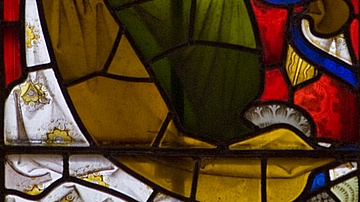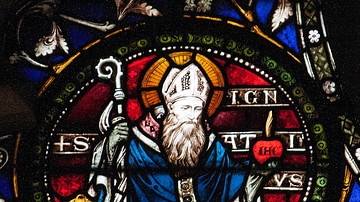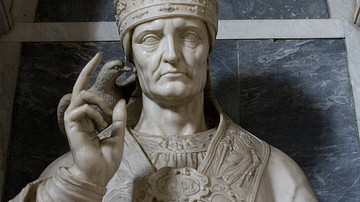Search Articles
Browse Content (p. 143)

Article
Food & Agriculture in Ancient Greece
The prosperity of the majority of Greek city-states was based on agriculture and the ability to produce the necessary surplus which allowed some citizens to pursue other trades and pastimes and to create a quantity of exported goods so that...

Article
Ptolemy's Letter to Flora
Although many Christians, theologians, and denominations have advocated for the idea that all biblical texts within the canon are one in spirit, authority, and ultimate authorship, not every reader of the Bible has come to the same conclusion...

Article
Ignatius of Antioch & His Letter to the Ephesians
For many people, the origins of the Christian church are shrouded in obscurity outside of the biblical narratives concerning Jesus Christ and his Jewish followers. Yet, after the crucifixion of Jesus and the initial missions work across the...

Article
Saint Augustine of Hippo & His Confession of Faith
Few theologians have attained as much renown and influence in history as Saint Augustine of Hippo (354-430 CE), a 'Doctor' of the Catholic Church and simply known by his peers as 'The Knowledgeable One.' A brilliant man who never sought to...

Article
Gregory the Great & His Pastoral Care
One of the most influential and important Christian leaders during the Early Medieval Period was Pope Gregory the Great (540–604 CE). Renown for his administrative prowess and ecclesiastical reforms during a time of "obscurantism, superstition...

Article
Cortés & the Fall of the Aztec Empire
The Aztec empire flourished between c. 1345 and 1521 CE and dominated ancient Mesoamerica. This young and warlike nation was highly successful in spreading its reach and gaining fabulous wealth, but then all too quickly came the strange visitors...

Article
Pizarro & the Fall of the Inca Empire
In 1533 CE the Inca Empire was the largest in the world. It extended across western South America from Quito in the north to Santiago in the south. However, the lack of integration of conquered peoples into that empire, combined with a civil...

Article
Cultural & Theological Background of Mummification in Egypt
Many myths and falsehoods concerning the Egyptian practice of mummification have been promoted to the general public in movies, television shows, and documentaries. While these offerings are entertaining and fascinating to watch, the purposes...

Article
Hanno: Carthaginian Explorer
In the 5th century BCE, the Carthaginian explorer Hanno sailed beyond the Pillars of Hercules, out of the Mediterranean and into hitherto unknown territory down the Atlantic coast of Africa. In his search to find new resources and trading...

Article
Carthaginian Trade
The Carthaginians, like their Phoenician forefathers, were highly successful traders who sailed the Mediterranean with their goods, and such was their success that Carthage became the richest city in the ancient world. Metals, foodstuffs...